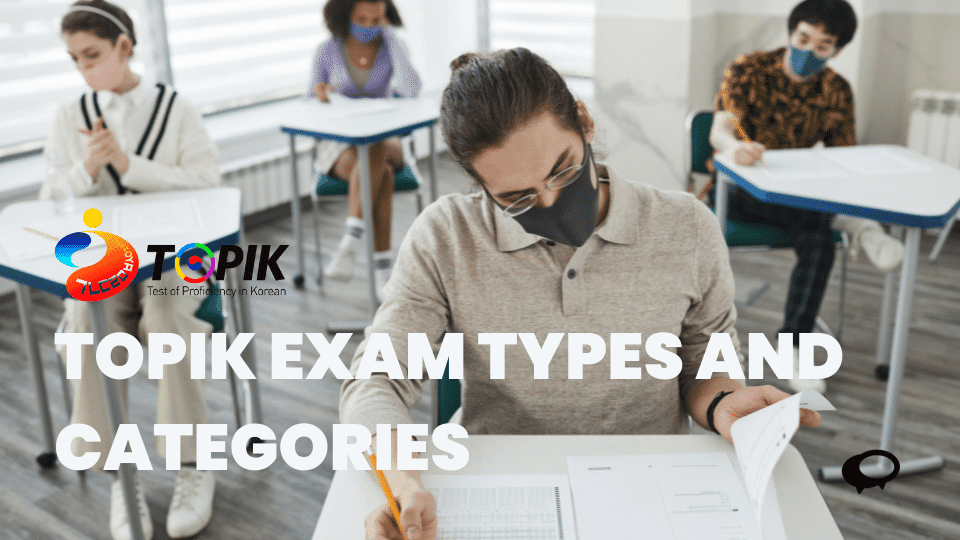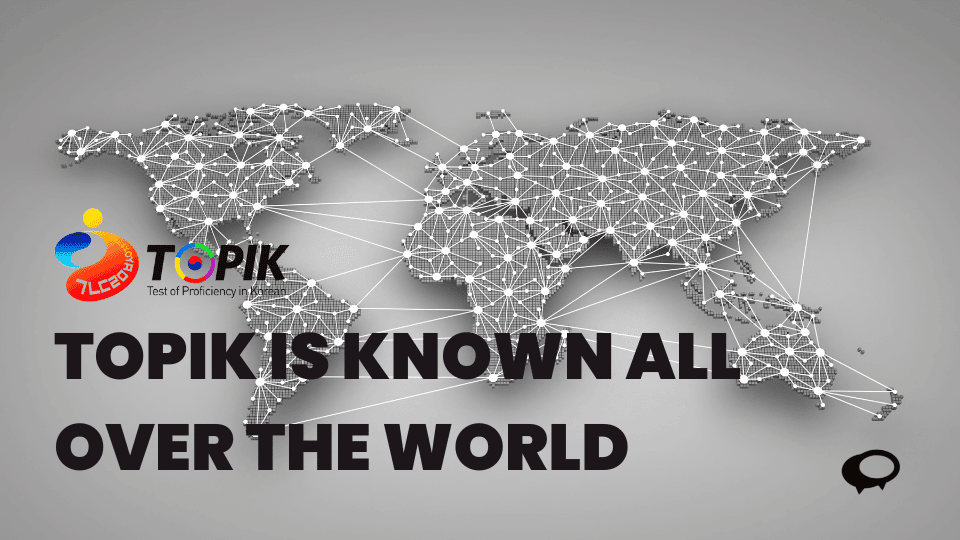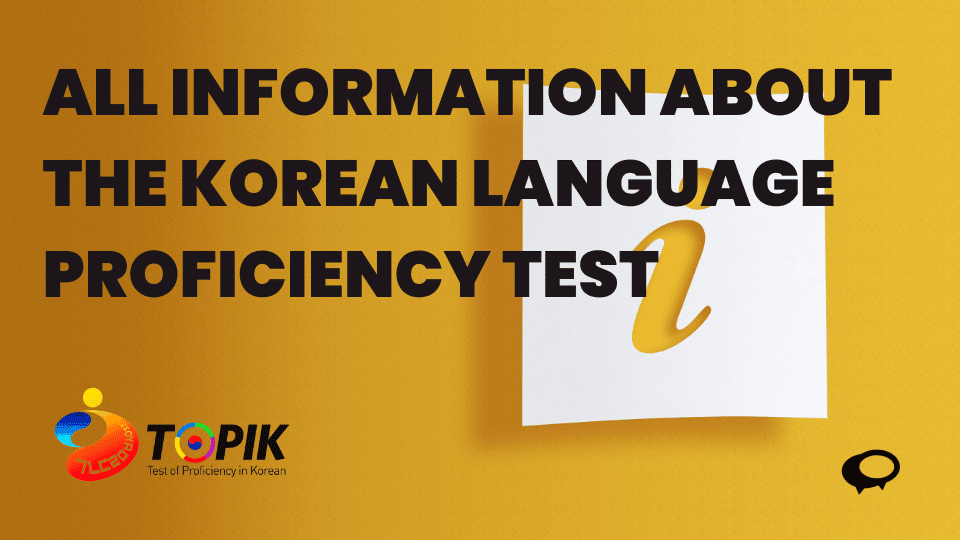All you need to know about TOPIK Test 2022
All you need to know about TOPIK Test 2022
All you need to know about TOPIK Test 2022 – Want to discover how well you can communicate in Korean? In such a case, you should take the TOPIK exam.
How fluent are you in Korean want to know? The 2022 TOPIK test is the most widely recognized examination of Korean language proficiency across the world. K-pop, K-drama, and other Korean cultural exports have inspired a worldwide uptick in interest in the Korean language. If you’re trying to learn Korean, you may be curious about where you are right now. There are several situations in which the TOPIK exam would be an excellent option. Check our article on why learn Korean language? These 10 reasons would want you to start learning Korean Asap.
Information about the test’s organization, question format, marking method, preparation, and more are all included on this page.
What are TOPIK Exams?

The Test of Proficiency in Korean, often known as the TOPIK exam, is a standardized test that examines a candidate’s proficiency in the Korean language. In 1997, the Korea Research Foundation was established with the mission of determining the level of applicant’s proficiency in the Korean language. This test is only for those who are not from the original population.
Topik test 2022 types and categories

The many forms of TOPIK examinations There are a total of three. The most widely used version is the standard TOPIK, often known as the S-TOPIK. The applicants do, however, have two additional options available to them: the B-TOPIK (Business TOPIK) and the EPS-TOPIK (Employment Permit System).
In addition to this, there is another one known as the KLAT test, which is something that I will talk about in the next post. Both of these tests are necessary to pass in order to qualify for certain jobs in South Korea, such as those in the professional or migrant labor sectors. I’ll go into more detail on them at a later time.
What is KLAT?
The Korean Language Ability Exam (KLAT) is a standardized Korean test that is administered in South Korea and across the globe. The old name was Korean Language Proficiency Test (KLPT). They created this test to assess the Korean proficiency of non-native Korean speakers.
The exam follows an assessment approach that takes into account the specificity of the objective as well as the evaluation purpose of testing the capacity to communicate in Korean. It evaluates the abilities of foreigners who do not speak Korean as their first language as well as abroad Koreans.
Who administers the TOPIK exams?
Since 2011, the TOPIK has been administered internationally by the National Institute for International Education (NIIED —국립국제교육원 ).
The NIIED, a government agency, supervises many components of the exam with the assistance of the Ministry of Education, Science, and Technology of the Republic of Korea.
TOPIK is known all over the world

TOPIK, which stands for “Test of Proficiency in Korean,” (한국어능력시험) is the most well-known test of Korean skills around the world.
TOPIK (한국어능력시험) is a great way to improve your profile, whether you want to stay in South Korea in comfort or get a job that requires you to speak Korean.
Almost all organizations, universities (both public and private) and government agencies accept and trust TOPIK certification.
Is it a good idea to take the TOPIK exam?

Using TOPIK has a number of benefits. It’s a chance for those who don’t speak the language natively to prove their skills. This is helpful for those who are not native Korean speakers but would want to work or attend school in South Korea. Potential employers may not be convinced by your Korean fluency on its own. When applying to a company, documentation is usually required before an interview is scheduled. Check our article on Jobs in South Korea for Indians
If that’s the case, having TOPIK certification on your resume may help you get beyond the first round of elimination. Scholarships, visas, and the ability to stay in South Korea permanently are all facilitated by this. In addition, knowing that what you already know is correct will reinforce your dedication to learning more. That’s sure to boost your self-esteem.
All Information about the Korean Language Proficiency Test

For non-native Korean speakers and members of the Korean diaspora, the TOPIK (한국어능력시험) is the most popular Korean language proficiency exam.
Let’s learn as much as we can about it.
Eligibility criteria & who can take TOPIK EXAMS?
There are no particular necessary qualifications and requirements. Anyone who does not speak Korean as their native language or as an abroad Korean is eligible to take the TOPIK in order to determine their current level of skill in the language. There is also no minimum age requirement to participate.
What are the different levels available on TOPIK EXAMS?

It may be broken down even further into a total of six separate groups thanks to its two primary levels, level 1 and level 2.
TOPIK I is the first level of the Korean language testing system and is broken down into two sublevels (level 1 and level 2).
There are a total of four sublevels in TOPIK II, which spans both intermediate and advanced levels (levels 3, 4, 5, and 6).
Syllabus for various levels of TOPIK exams 2022

The first level of this Korean language course includes rudimentary Korean topics such as fundamental linguistic terms, basic sentence forms, and around 800 vocabularies.
On the other hand, individuals who have reached an almost native level of fluency are qualified to go on to level 6, which is the most challenging of the levels.
You need to get yourself ready for each of the specific levels of linguistic ability that are listed below.
| Level | Linguistic Competence |
| TOPIK 1 Level 1 | Able to cany out basic conversations related to daily surviving skills such as self-introduction. purchasing, ordering food. etc., and understand the contents related to very personal and familiar subjects such as himself/herself. family, hobby, weather, and the like. Able to create simple sentences based on a basic vocabulary of approximately 800 words and possess an understanding of basic grammar. Able to understand and compose simple and useful sentences related to everyday life |
| TOPIK 1 Level 2 | Able to carry out simple conversations related to daily routines such as making phone calls and asking a favor, as well as using public facilities in daily life Able to use about 1.500 to 2.000 vocabulary and understand personal and familiar subjects in a certain order, such as paragraphing Able to use formal expression and informal expression accordingly, respective to the situation. |
| TOPIK 2 Level 3 | Able to carry out a daily routine, with fair use of public facilities, and able to socialize without significant difficulty. Able to express or understand social subjects familiar to oneself, as well as specific subjects, based on the paragraph. Able to understand and differentiate written language and spoken language based on their distinctive basic characteristics |
| TOPIK 2 Level 4 | Able to use various public facilities, socialize, and carry out some degree of ordinary work. Able to understand easy parts in news broadcasts and newspapers Able to understand and use the expressions related to social and abstract subjects relatively correctly and fluently Able to understand social and cultural subjects, based on the understanding of Korean culture and frequently used idiomatic expression |
| TOPIK 2 Level 5 | Able to perform a linguistic function to some degree which is necessary for research and work in professional fields Able to understand and use the expressions related to even unfamiliar aspects of politics, economics, society, and culture Able to use the expression properly, depending on formal, informal, spoken/written context. |
TOPIK test structure, time, and duration

The hearing, reading, and writing abilities necessary for the Korean language are evaluated on the TOPIK exam, with three distinct ability levels available: beginner, intermediate, and advanced. The reading and listening comprehension portions of the TOPIK-I each take up 60 minutes of the test’s total length of 100 minutes (40 minutes).
The TOPIK–II includes a break that lasts for three hours throughout the test. It is broken up into three parts: reading (50 minutes), writing (70 minutes), and listening (110 minutes combined). The TOPIK exam does not currently have a speaking element; but, beginning in 2023, they will begin to include it.
Types of Questions (Question formats)

Questions are presented in a multiple-choice style (multiple-choice questions). However, at the TOPIK 2 level, there is a written exam that demands short replies.
There are a total of 70 multiple-choice questions on TOPIK 1 (Levels 1-2). The time allotted for this exam is 100 minutes, and there are a total of 200 possible points.
50 multiple-choice questions (MCQ) based on reading passages, 50 MCQs based on listening passages, and 4 essay-type short-answer questions make up TOPIK 2 (Level 3-6). There is a 180-minute time limit and a 300-point scale.
| Test type | Test period | Test section (duration) | Test item type | Number of test items | Range of score | Total score |
| TOPIK 1 | 1st | Listening(40mins) | Multiple-choice | 30 | 0-100 | 0-200 |
| TOPIK 1 | 1st | Reading(60mins) | Multiple-choice | 40 | 0-100 | 0-200 |
| TOPIK 2 | 1st | Listening(60mins) | Multiple-choice | 50 | 0-100 | 0-300 |
| TOPIK 2 | 1st | Writing(50mins) | Supply type | 4 | 0-100 | 0-300 |
| TOPIK 2 | 2nd | Reading(70mins) | Multiple-choice | 50 | 0-100 | 0-300 |
Scores needed to pass the Topik test 2022

The minimum required score to pass each level is different. In order to pass stages 1 and 2, you need a score of 80 and 140 out of a possible 200. On the other hand, it may be anywhere from 120 to 230 for levels 3 to 6.
You may check the table that follows to see what score you need to get in order to go to the next level.
| TOPIK Levels | Passing Points (Range) |
|---|---|
| Level 1 | 80 – 139 |
| Level 2 | 140 – 200 |
| Level 3 | 120 – 149 |
| Level 4 | 150 – 189 |
| Level 5 | 190 – 229 |
| Level 6 | 230 – 300 |
How does one sign up to take the TOPIK exam?

The TOPIK exam is administered in the majority of nations by the Embassy of the Republic of Korea.
Facilitation of the application process is also provided by the King Sejong Institute, the Korean cultural center, and other organizations that work in collaboration. You may sign up for the TOPIK exam in Korea via the official website, which is topik.go.kr Visit the website, choose the difficulty level and testing location, and then complete the transaction by providing money.
There may be variations in the needed documentation for each application. In order for you to communicate with the center that is close by. You are going to need two photographs that are passport-sized, an identification card, and the cost of registering to vote.
Where does TOPIK stand in terms of its reliability?
Only two years count toward the TOPIK validity period, beginning on the day when test result notifications are sent out. After this time period has passed, you will need to retake it in order for it to count officially.
2022 TOPIK test dates
They administer the test six times a year, most of the time on Sundays, and they do not deviate from the dates that are specified. Only Korea has exams in the months of January, May, and November. All other nations, including South Korea, celebrate in the months of April, July, and October.
| Exam | Test Dates | Registration Period | Result Dates | Locations |
|---|---|---|---|---|
| 80th TOPIK | January 23, 2022 | Dec 7, 2021 – Dec 13, 2021 | February 22 | Korea |
| 81st TOPIK | April 10, 2022 | Feb 8, 2022 – Feb 14, 2022 | May 19 | Korea/Overseas |
| 82nd TOPIK | May 15, 2022 | March 8, 2022 – March 14, 2022 | June 30 | Korea |
| 83rd TOPIK | July 10, 2022 | May 24, 2022 – May 30, 2022 | August 18 | Korea/Overseas |
| 84th TOPIK | October 16, 2022 | Aug 2, 2022 – Aug 8, 2022 | November 24 | Korea/Overseas |
| 85th TOPIK | November 13, 2022 | Sept 6, 2022 – Sept 13, 2022 | December 15 | Korea |
The dates are different from one nation to the next. Make sure you check with the exam facilities in your area. They administer two TOPIK-I sublevels in the morning, and four TOPIK-II sublevels over both the morning and afternoon sessions. As a result, you now have the option of taking both on the same day if you so choose.
TOPIK examination centers in India

As of January 2022, there are 314 testing centers, with 54 in South Korea and the remaining exam centers in 87 different nations. India has 5 centers. In India, you may take the TOPIK test in one of five cities: Chennai, Delhi, Hyderabad, Jharkhand, or Manipur. In other words, certain centers may be eliminated while others are added, and this is conditional on the specifics of the circumstance. The TOPIK examination is scheduled to be given in New Delhi, Manipur, and Chennai in July 2022.
New Delhi
Address: Korean Culture Center, 25-A, Ring Road, Lajpat Nagar – IV, New Delhi.
Contact: 011 – 43345046 / 5000. Email: topikdelhi@gmail.com
Website: LINK
Chennai
Address: The InKo Centre, 18, Adyar Club Gate Road, Chennai.
Contact: 044 – 2436 1224/6, Email: enquiries@inkocentre.org
Website: LINK
Ranchi
Address: CFEL, Room No 29, Central University of Jharkhand, Brambe, Ranchi.
Contact: 8797811727 / 8800256914, Email: jha161@yahoo.com / mkjjnu@gmail.com
Website: LINK
Manipur
Address: 2nd Floor, Manipur University, Canchipur, Imphal, Manipur.
Contact: 98560-71440, Email: iboymaimas@gmail.com
Website: LINK
Hyderabad
Registration Centre
Address: Honorary Consulate General, Korea House, No. 64, Road No. 14, Film Nagar, Hyderabad.
Contact : 044 – 23/24 999999, 99080-50005
Examination Centre
Address: Hyundai R&D Centre, Annex Building, First Floor 1, Survey No 5/2 & 5/3, Opp. HITEC City MMTS Railway Station, Izzathnagar, Kondapur, Hyderabad.
How much do TOPIK Exams cost?

The price varies based on the amount of participation and the country chosen. In South Korea, the registration fee for TOPIK I (levels 1-2) is KRW 40,000 and TOPIK II (levels 3-6) is KRW 55,000. The charge in the United States ranges from $20 to $30. In India, the price range is between ₹800 and ₹1000 rupees. For most centers in India, TOPIK exam fees are ₹ 1000 for TOPIK 1 and ₹ 1,300 for TOPIK 2.
Where and when are Topik test 2022 announcements of Test results made?
The TOPIK website allows you to see your test results. In addition, they give score reports to all applicants, regardless of success or failure. You may also print the results within a two-year window. To get your exact results, you must provide the test number, application number, and date of birth. The report also includes your total, average, and individual scores, as well as your passing or failing status.
How should one prepare for the TOPIK exam?

Many believe Korean to be one of the most difficult languages to master. The Foreign Service Institute (FSI) of the United States has also classified it as category IV (Super-hard languages). The good news is that there are techniques to simplify the process. So where should you learn Korean and prepare for Topik 2022 exams? If you live in Navi Mumbai then Learnlanguages.store is an awesome place to start with.
There are several books, instructors, audio and video tutoring, language applications, websites, and online classes available. The list continues. The bad news is that you must still devote time to studying.
There are no magic wands that can instantly implant all of this vocabulary, connections, pronunciation, different verb ending forms, and honorifics into your brain.
First, developing an effective study plan and locating a teacher or enrolling in a language school as an expert tutor can accelerate your development. Don’t get trapped. Be constant in your approach to learning. You may also learn Korean by watching films. You might use widely accessible online practice exams to assess your existing skills.
You may also try a large number of question papers and examples from the previous year to assist you to achieve your objective. Of course, it involves a great deal of effort and persistence, but this is the case with most important studies. The TOPIK exam certification may add significant value to your resume and aid you in all of your personal and professional efforts!
Do you intend to take the examination? Share your comments in the following comment box.
Learn Languages Store
Vashi,
Email: services@learnlanguages.store










